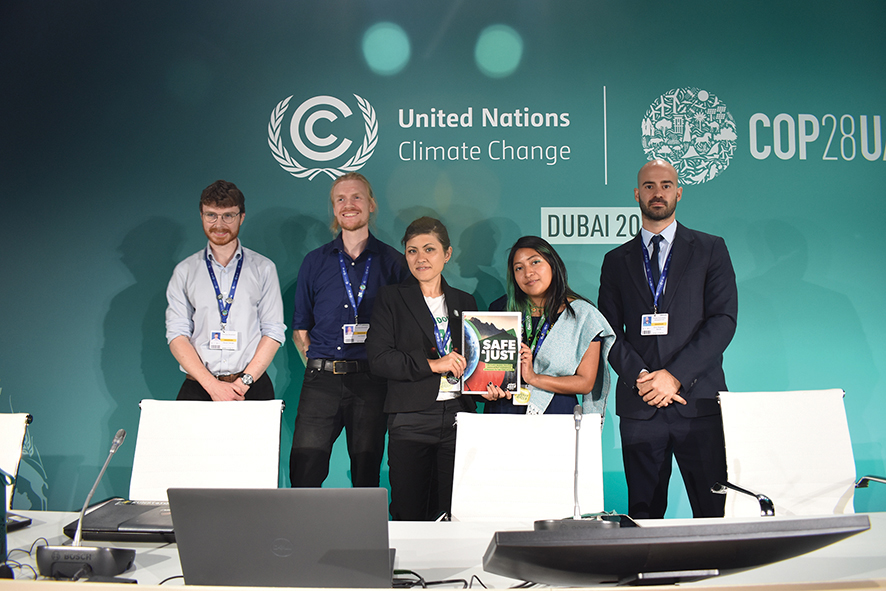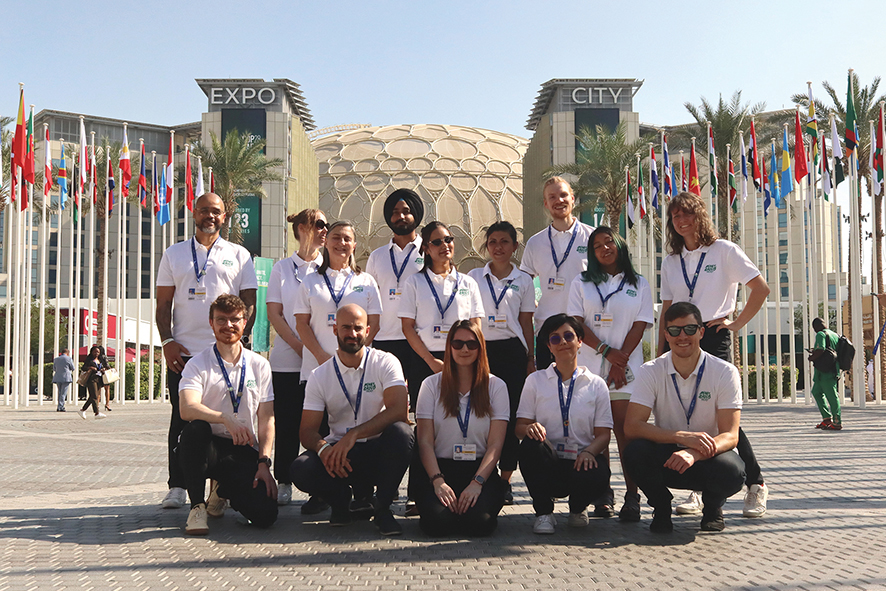For the past 27 years, the United Nations Climate Change Conference managed to ignore the cow in the room. This year at COP28 in Dubai, UAE, things started to change, albeit not necessarily in a good way. Despite food systems accounting for a third of global greenhouse gas emissions, the discussion around this topic has only just begun. Even if we decide to keep fossil fuels in the ground from now on, the emissions from the food system alone will still take us beyond the 1.5 degrees Celsius global temperature rise limit of the Paris Agreement. With the science being clear, the animal agriculture industries can no longer hide the cow in the room, so they are resorting to either downplaying their impact on the climate or, worse, portraying the cow as a climate solution hero.
Our current animal-based food system is wreaking havoc on our planet, contributing not only to climate change but also to the breaking of other planetary boundaries such as land use, biodiversity loss, phosphorus and nitrogen, and freshwater use. Renowned scientist Johan Rockström said at COP28 that “food systems transition is equally important [as fossil fuel phase-out].” Although the conference is mainly focused on climate change, it is essential to remove our ‘carbon tunnel vision’ to understand how this planetary boundary interacts with others to see the bigger picture of the Earth crisis we find ourselves in.
A whopping 36% of anthropogenic methane emissions come from farmed animals, making it the single largest source of this greenhouse gas. Since it is much more potent than CO2, with a Global Warming Potential of more than 80 over a 12-year period, eliminating it is our best hope for immediate impact in slowing down global warming.

Yet, dairy-based companies could be seen at COP28 talking about making their industry a “climate solution,” with so-called solutions being methane masks for cows, feed additives, and selective breeding. In the face of this climate emergency, these greenwashing tactics are merely rearranging deck chairs on the Titanic—it is imperative that we stop farming ruminant animals if we want a chance at preserving our planet.
83% of the planet’s agricultural land is occupied by animal agriculture, yet animal products provide only 18% of global calories and 37% of protein
Our current food system is not only environmentally damaging; it is extremely inefficient. 83% of the planet’s agricultural land is occupied by animal agriculture, yet animal products provide only 18% of global calories and 37% of protein. This also raises the question of food justice—how are we producing enough food to feed around 80 billion farmed animals each year, yet not enough to feed humans?
On December 10th at COP28, it was Food, Agriculture, and Water Day, and the Plant Based Treaty team held a press conference on the release of the new report titled ‘Safe and Just: The Plant Based Treaty’s Vegan Doughnut Economics Approach to the Food System.’ This groundbreaking report is inspired by and modeled on respected Oxford economist Kate Raworth’s Doughnut Economics framework, and it provides a holistic and systems-thinking approach to creating a food system that is both ecologically safe and socially just.
The ‘Safe and Just’ report gives a comprehensive overview of our current planetary crisis and a guide on how we can move back into a safe operating space. A plant-based food system with restorative, regenerative, and diversified crop production practices can help create a resilient food system that will be a carbon sink rather than a carbon source. And since the IPCC’s carbon budget makes the optimistic assumption that we have already made the food systems transition, we must take immediate action to realize this new food system.
In fact, this is not only a new food system, but it was also one of the past. More often than not, delegates from wealthy Global North countries could be heard using Indigenous Peoples as an excuse to justify their consumption of animal products. Youth Indigenous activist from Mexico Xananine Calvillo stated at the official opening of the Food4Climate Pavilion that plant-based food systems had existed for 10,500 years in Mesoamerica: “This is not something that we are doing alone, but is something that we are building on the work of our Elders but also on the dreams of the Youth.”
We rarely hear those same delegates talk about the dangers and struggles Indigenous Peoples of the Amazon face with deforestation, forest fires, and land grabbing by industrial agriculture and factory farming, and how Western animal-based diets threaten the oral traditions surrounding ancestral diets. Interestingly, meat giants including JBS and Marfrig were sponsors of the Amazon pavilion, where chicken meat could be found served for catering. We conducted interviews with people visiting this pavilion, asking their opinion on this fact, and nobody seemed to find it mind-boggling. Or in other cases, they found this topic uncomfortable and were hesitant to comment on it.

As global temperatures increase, the number of animal agriculture lobbyists also rises. According to DeSmog, there were three times as many meat and dairy lobbyists at this year’s COP as compared to the previous year. The Plant Based Treaty team was joined by other vegan individuals and organizations in protesting against such lobbyists, and to demand that a Plant Based Treaty be negotiated at COP28. The treaty calls for a food system change through 3 key points – to stop land use change for animal agriculture, redirect subsidies from animal-based to plant-based food systems, and restore ecosystems.
But is there hope?
Members of the Plant Based Treaty together with a coalition of other vegan and environmental organizations pushed for the specific inclusion of the words “plant-based” in the COP28 UAE Declaration on Climate and Health (which Georgia has not signed), but the final text only stated the vague wording “sustainable healthy diets,” which can be open to several interpretations. The outcome of COP28 assumes that there is such a thing as “sustainable” animal agriculture, which clearly goes against the science.
However, there is significant improvement since last year’s COP in Sharm El-Sheikh, Egypt, where vegan food was next to impossible to find. COP28 in Dubai had a fully vegan food park in the Blue Zone, which was run by PXB Lifestyle, where a variety of food was served, including national dishes, healthy meals, and more indulgent ones. The menus even included carbon labeling, which is recommended in the ‘Safe and Just’ report for transparency so consumers can make informed decisions about what they eat. Although the plant-based foods have nothing to hide—it’s the animal-based dishes that need honest labeling! Interestingly, the menus at this food court did not have huge ‘vegan’ labels everywhere (while still making it clear that the food did not contain any animal products), which helps with normalizing plant-based foods and making them the default, as they will inevitably become in the future. The general feedback at the plant-based food court was that the food was delicious and that many of the delegates were unaware that it was all vegan!
Another positive step was seeing the vegetable farm in the Green Zone where the food grown is used as ingredients for the permanent vegan cafe and restaurant onsite, where vegan cooking masterclasses were held during the conference. This serves as a model for future green cities, where communities come together to cultivate their own food, helping to restore our relationship with nature. This includes fostering respect for other animals that share our planet, recognizing their inherent right to live free from harm and exploitation.
It was encouraging to see so many other delegates at the conference this year who happened to be vegan, as last year we hardly met any outside of plant-based organizations. It proves that with the right information, individuals can make conscious decisions about what they eat. This is why climate literacy and health education play a key role in shaping our food system, as discussed in ‘Safe and Just’. According to an Oxford study, adopting a vegan diet is the single most effective way to reduce our impact on the environment, surpassing measures such as going car-free or avoiding transatlantic flights.
Azerbaijan can make history and real progress at next year’s COP29 if it hosts a fully vegan climate conference that’s in alignment with our global climate target, and if all parties unite to adopt a Plant Based Treaty for a safe and just transition of our food system.
Read the full ‘Safe and Just’ report at VeganDonutEconomics.org














